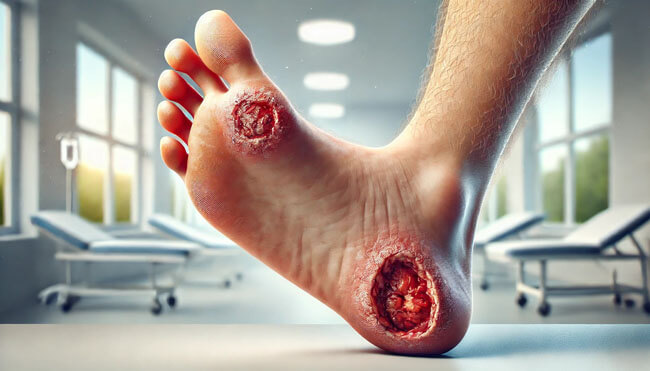
Curare, a homeopathic remedy derived from natural sources, has found its niche in managing specific conditions, particularly glycosuria (sugar in urine) associated with motor paralysis. Known for its potent effects on the muscular and nervous systems, Curare holds a unique place in homeopathic Materia Medica.
Derived From:
Curare is derived from the extract of various South American plants, primarily from the genus Chondrodendron and Strychnos species. It belongs to the plant kingdom and is traditionally known for its use as an arrow poison in indigenous hunting practices.
Main Indication: Diabetes Mellitus with Glycosuria
Curare is primarily indicated for individuals suffering from diabetes with glycosuria, accompanied by profound muscular weakness and motor paralysis. Its unique action targets both the metabolic and neuromuscular symptoms associated with diabetes.
Main Symptoms of Curare in Diabetes
1. Glycosuria with Motor Paralysis
- Significant sugar excretion in urine, pointing to impaired glucose metabolism.
- Accompanied by weakness and inability to perform fine motor activities such as playing musical instruments.
2. Neuromuscular Weakness
- Weakness in hands and fingers, particularly in pianists or individuals performing intricate tasks.
- Reflexes are diminished or completely abolished, indicating nerve involvement.
3. Ptosis (Drooping of Eyelids)
- Particularly affects the right side, a hallmark symptom in cases suitable for Curare.
4. Severe Dyspnoea (Difficulty in Breathing)
- A feeling of suffocation, often distressing for the patient, is a characteristic symptom.
5. Fatigue and Paralysis
- Profound exhaustion coupled with muscular paralysis is a notable indication.
Therapeutic Uses of Curare for Diabetes
1. Glycosuria Management
Curare has shown efficacy in regulating blood sugar levels and reducing glycosuria. Its impact extends to addressing the nervous system’s role in metabolic dysfunctions.
2. Neuromuscular Symptoms
Patients experiencing motor paralysis and muscular debility benefit from this remedy. Curare is particularly helpful for professionals like pianists whose careers depend on fine motor skills.
3. Chronic Conditions
This remedy is most suitable for chronic diabetes cases where nerve degeneration and muscle weakness predominate.
Is Curare Suitable for Type 1 or Type 2 Diabetes?
Curare is predominantly used in cases resembling Type 2 diabetes due to its focus on glycosuria and its associated muscular symptoms. While it is not the primary choice for insulin-dependent diabetes (Type 1), it can be complementary in addressing neuropathic symptoms.
Key Conditions for Curare Use in Diabetes
- Glycosuria with a notable loss of muscular control.
- Chronic diabetic neuropathy.
- Diabetic-related motor paralysis and reflex abnormalities.
- Persistent ptosis and dyspnoea as secondary symptoms of diabetes.
Acute, Severe, or Chronic Cases
Curare is most effective in chronic conditions, particularly where diabetes has progressed to involve the muscular and nervous systems significantly. However, in severe cases, it may provide symptomatic relief for motor dysfunctions.
Frequently Asked Questions (FAQs)
1. Can Curare Cure Diabetes?
No, Curare is not a cure for diabetes. It is a complementary homeopathic remedy aimed at managing specific symptoms such as glycosuria, muscular weakness, and neuropathy associated with diabetes.
2. How is Curare Administered?
Curare is prescribed in potentized doses, typically under the guidance of a qualified homeopathic practitioner. Common potencies include 30C or 200C based on the individual’s symptoms and overall constitution.
3. Is Curare Safe for Everyone?
Curare should only be used under professional supervision, as its toxic origins necessitate careful and precise dosing. It may not suit all diabetic patients, especially those without neuromuscular symptoms.
4. Can Curare Replace Conventional Diabetes Medication?
No, Curare should not replace conventional treatment. It is a complementary remedy to address specific symptoms alongside regular medical management.
5. How Long Does It Take for Curare to Show Effects?
The time frame varies depending on the severity of symptoms, chronicity, and the individual’s responsiveness to the remedy.
Select Your Homeopathic Medicine Dose and Potency
Potency Selection Guide
Relationship of Remedies
Why Meds Media Diabetes guides are different
We focus on simple explanations of blood sugar, diet, medicines, and lab tests so you can have clearer conversations with your diabetes doctor.
Nothing here replaces medical care. Always follow the advice of your diabetologist or healthcare provider before changing any medicine, insulin, or diet plan.
Similar Posts You may also like

Nux vomica: Homeopathic Medicine for Diabetes, Uses and Indications

Top 10 Homeopathic Medicines for Diabetic Foot Ulcer

Remedy for Diabetes rheumatic pains in homeopathy

Uranium Nitricum (Uran-n): A Bird’s Eye View of the Homeopathic Diabetes Remedy

Mouth Symptoms in Diabetes:Homeopathic Medicines and Their Indications

Face Symptoms in Diabetes:Homeopathic Medicines and Their Indications

Hearing Symptoms in Diabetes:Homeopathic Medicines and Their Indications

VISION: Diabetes Symptoms and Homeopathic Medicines

Eyes-related symptoms in diabetes: Homeopathic Medicines and Their Indications

Head-related symptoms in diabetes: Homeopathic Medicines and Their Indications

Vertigo Symptoms in Diabetes: Insights for Homeopathic Treatment

Mind Symptoms in Diabetes: Rubric, and Homeopathic Remedies

Repertorial Symptoms Related to Diabetes Mellitus and Its Complications

Homeopathic Medicines and Concomitants for Managing Diabetes

Diabetes: Causes, Miasms, and Homeopathic Medicines

Diabetes and Homeopathy: Effective Remedies According to Boericke’s Materia Medica

Diabetes and Sugar in Urine: Homeopathic Remedies

